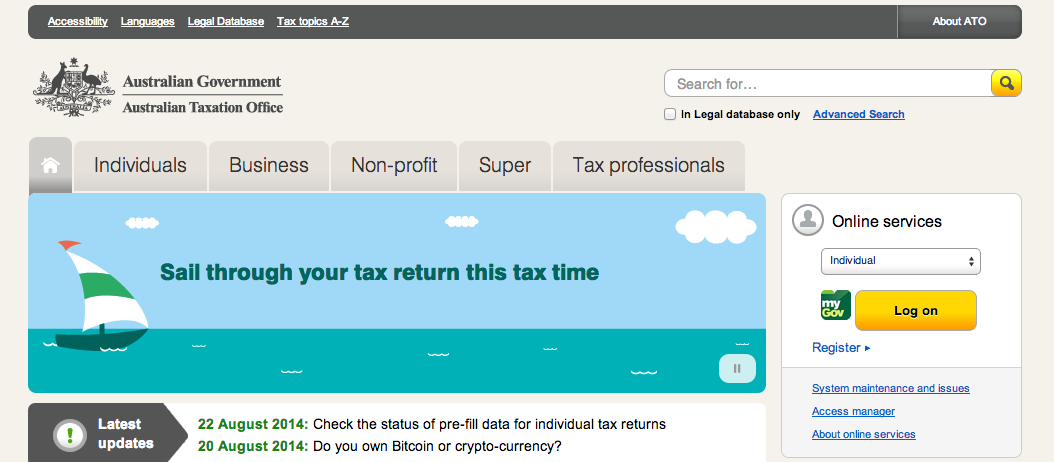The Bitcoin cause might have taken a small step backward last week with the announcement by the Australian Tax Office (ATO) that Bitcoin would not be considered “money” for tax purposes.

Not ‘Money’
The move is, to say the least, an interesting one when we consider the popularity of Bitcoin in the country and the large number of Bitcoin startups, including more than 100 Bitcoin ATMs expected by 2015 nationwide.
The ATO began making noises about Bitcoin and virtual currencies last year when it expressed concerns about tax evaders. Their concern however seemed to be with the anonymity of BTC transactions as a result of the hundreds of billions that are lost to tax evaders globally each year.
Nevertheless, at the same time the ATO recognizes that virtual currencies are no more anonymous than fiat currencies. In a statement to the Australian Financial Review Michael Hardy, senior assistant commissioner for the ATO said:
“Bitcoin is no more anonymous than physical cash and the ATO has experience in working with earlier forms of anonymous electronic money systems, and with physical cash, which are relevant for responding to new and emerging systems.”
- Michael Hardy
While the Australian National Bank has not been particularly friendly to Bitcoin, even cutting associations with Bitcoin related businesses earlier this year, the Australian Tax Office has expressed interest in working with Bitcoin albeit stopping short of considering the idea of Bitcoin as “money” for tax purposes.
The new guidelines treat individual transactions under AUD$10,000 as not liable for income or GST as long as the individual is not running a business or enterprise and they are simply paying for goods or services with virtual currencies. The guidelines say that:
“Where an individual uses bitcoin to purchase goods or services for personal use or consumption, any capital gain or loss from disposal of the bitcoin will be disregarded as a personal use asset – provided the cost of the bitcoin is $10,000 or less.”
A Double Tax?
Businesses, however, are an entirely different matter in the ATO’s eyes and it is here that the problem of potential double taxing appears. Businesses must record the value of all Bitcoin transactions with the rest of their ordinary income. But when they supply Bitcoin to a client, they must charge GST and in many cases are subject to GST when receiving payment in Bitcoin for goods and services as well. One government website explained it this way:
“If you receive payment by Bitcoin, you’ll need to record:
- The date of the transaction
- The amount in Australian dollars (a reputable bitcoin exchange can tell you this)
- What the transaction was for
- Who the other person or business was.
Bitcoin payments made to you by customers will become part of your taxable income. You may also have to pay GST when receiving Bitcoin in return for goods and services.”
The government has left a link for citizens to comment on different aspects of the new regulations. There are four draft tax determinations to consider when commenting.
Businesses will need to be active because the new law mandates requires quite an effort from the Bitcoin enterprises’ side. The ATO has not determined the date that the new rules will go into effect, nor have they ruled whether they will be applied retroactively. This is an important aspect to consider as well because while the potential double taxation is likely to discourage the expansion of virtual currencies in Australia, retroactive application of these new rules might even force current businesses to flee offshore.
This point was echoed by Ron Tucker, Chairman of the Australian Digital Currency Commerce Association and a partner at digital currency trading service BitTrade who told Cointelegraph via email:
“The digital currency industry in Australia is a hotbed of innovation and entrepreneurship and has the potential to make the country a regional, if not global leader in financial services. This potential however could easily be undermined by an uncompetitive and unworkable tax regime that sends the industry offshore to other countries such as Singapore and Hong Kong, where of course Australian GST does not apply.”
You can donate to the Bitcoin Association of Australia to help improve the proposed rules here.
Did you enjoy this article? You may also be interested in reading these ones:
- Australia’s Tax Office Delays Decision on Bitcoin
- Australia Offers Slightly More Clarity on BTC Taxation
Download our sleek and user-friendly free iOS app so you never miss the latest stories!
